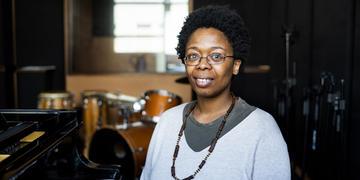
In his introduction to the World of Music’s special issue on South African jazz (2016), Nishlyn Ramanna identifies two main streams of research on the country’s jazz. The first is indebted to social history (this speaker’s intellectual home); the second to ‘close musical analyses of particular styles, compositions and recorded improvisations’ (2016: 7). These streams have rarely met, and their separation is not unrelated to the country’s separatist – apartheid – past. Post-apartheid, South African jazz studies has seen growing scholarly contributions from young black researchers who are primarily performers, and whose interests are close musical analysis and transcription. This is a development that should be met with caution, for at least two reasons. First, uncritical adoption of so-called western musical vocabularies may lead to a degree of conflict between what is heard and what may make sense on paper. Second, it may lead to the erasure of this music’s formative contexts: what languages did these musicians use to make sense of jazz? Revisiting how black South African jazz musicians ‘talked’ music theory reminds us of the polyglot urban spaces they inhabited, despite the white government’s displeasure. It also enables us to consider further the process of American jazz’s adoption in apartheid South Africa. In this paper, I trace the history of this process to the colonial encounter, and discuss briefly how mission-educated black choral composers negotiated these dynamics. I then focus on the archival manuscript (in particular its marginalia and paratexts) of the composer Todd Matshikiza’s King Kong: An African Jazz Opera (1959). This, then, is a story of black South African jazz musicians who described rests as ‘birds’ and staff notation as ‘sticks’ on the page, and for whom free jazz’s improvisational flourishes were the ‘chicken run’. Building on Ramanna, I insist that the streams should meet: the inscription of South African jazz must not be at the cost of its socio-historical complexity.
Dr Lindelwa Dalamba teaches music history at the University of the Witwatersrand's School of Arts, Department of Music. She is an historian of jazz, focussing specifically on South African jazz history in the country and in exile during the apartheid years. Her current research projects are on Todd Matshikiza and on South African jazz's Afro-modernisms.
Free to attend, register here. Please note that places are limited and registration closes at 10am on the day of the event. **UPDATE: Registration will now close at midday for this seminar.**
About the series:
The Oxford Seminar in Music Theory & Analysis (OSiMTA) meets two or three times a term. Its convenors are Professor Jonathan Cross and Dr Sebastian Wedler.
Our conception of theory and analysis is critical, plural and interdisciplinary. In shaping the seminars, we aim to reflect the broad range of activity taking place under the heading of theory and analysis today, as well as to challenge boundaries, embracing not only ‘conventional’ practices, histories of theory and repertoires, but also new interdisciplinary approaches that engage with cultural studies, ethnomusicology, aesthetics and philosophy, psychology, politics, performance studies, popular music studies, and so on. Speakers include distinguished local, national and international scholars.
Seminars are open to all, including the general public. Sessions will last 90 minutes and lively discussion is encouraged. They take place on Wednesday afternoons, beginning at 16.30 UK time (currently via Zoom only).
Regular updates will appear on the main series page. You can also follow OSiMTA on Twitter.